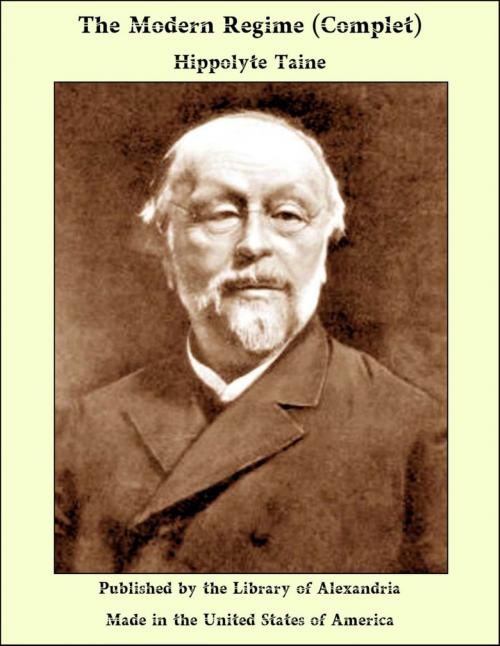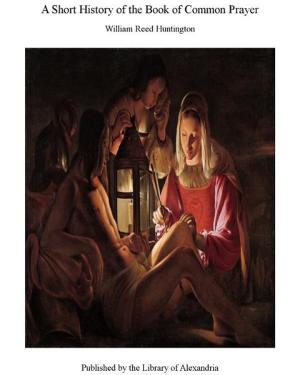The Modern Regime (Complete)
Nonfiction, Religion & Spirituality, New Age, History, Fiction & Literature| Author: | Hippolyte Adolphe Taine | ISBN: | 9781465597779 |
| Publisher: | Library of Alexandria | Publication: | March 8, 2015 |
| Imprint: | Language: | English |
| Author: | Hippolyte Adolphe Taine |
| ISBN: | 9781465597779 |
| Publisher: | Library of Alexandria |
| Publication: | March 8, 2015 |
| Imprint: | |
| Language: | English |
The following third and last part of the Origins of Contemporary France is to consist of two volumes. After the present volume, the second is to treat of the Church, the School and the Family, describe the modern milieu and note the facilities and obstacles which a society like our own encounters in this new milieu: here, the past and the present meet, and the work already done is continued by the work which is going on under our eyes.—The undertaking is hazardous and more difficult than with the two preceding parts. For the Ancient Régime and the Revolution are henceforth complete and finished periods; we have seen the end of both and are thus able to comprehend their entire course. On the contrary, the end of the ulterior period is still wanting; the great institutions which date from the Consulate and the Empire, either consolidation or dissolution, have not yet reached their historic term: since 1800, the social order of things, notwithstanding eight changes of political form, has remained almost intact. Our children or grandchildren will know whether it will finally succeed or miscarry; witnesses of the denouement, they will have fuller light by which to judge of the entire drama. Thus far four acts only have been played; of the fifth act, we have simply a presentiment.—On the other hand, by dint of living under this social system, we have become accustomed to it; it no longer excites our wonder; however artificial it may be it seems to us natural. We can scarcely conceive of another that is healthier; and what is much worse, it is repugnant to us to do so. For, such a conception would soon lead to comparisons and hence to a judgment and, on many points, to an unfavorable judgment, one which would be a censure, not only of our institutions but of ourselves. The machine of the year VIII, applied to us for three generations, has permanently shaped and fixed us as we are, for better or for worse. If, for a century, it sustains us, it represses us for a century. We have contracted the infirmities it imports—stoppage of development, instability of internal balance, disorders of the intellect and of the will, fixed ideas and ideas that are false. These ideas are ours; therefore we hold on to them, or, rather, they have taken hold of us. To get rid of them, to impose the necessary recoil on our mind, to transport us to a distance and place us at a critical point of view, where we can study ourselves, our ideas and our institutions as scientific objects, requires a great effort on our part, many precautions, and long reflection.—Hence, the delays of this study; the reader will pardon them on considering that an ordinary opinion, caught on the wing, on such a subject, does not suffice. In any event, when one presents an opinion on such a subject one is bound to believe it. I can believe in my own only when it has become precise and seems to me proven.
The following third and last part of the Origins of Contemporary France is to consist of two volumes. After the present volume, the second is to treat of the Church, the School and the Family, describe the modern milieu and note the facilities and obstacles which a society like our own encounters in this new milieu: here, the past and the present meet, and the work already done is continued by the work which is going on under our eyes.—The undertaking is hazardous and more difficult than with the two preceding parts. For the Ancient Régime and the Revolution are henceforth complete and finished periods; we have seen the end of both and are thus able to comprehend their entire course. On the contrary, the end of the ulterior period is still wanting; the great institutions which date from the Consulate and the Empire, either consolidation or dissolution, have not yet reached their historic term: since 1800, the social order of things, notwithstanding eight changes of political form, has remained almost intact. Our children or grandchildren will know whether it will finally succeed or miscarry; witnesses of the denouement, they will have fuller light by which to judge of the entire drama. Thus far four acts only have been played; of the fifth act, we have simply a presentiment.—On the other hand, by dint of living under this social system, we have become accustomed to it; it no longer excites our wonder; however artificial it may be it seems to us natural. We can scarcely conceive of another that is healthier; and what is much worse, it is repugnant to us to do so. For, such a conception would soon lead to comparisons and hence to a judgment and, on many points, to an unfavorable judgment, one which would be a censure, not only of our institutions but of ourselves. The machine of the year VIII, applied to us for three generations, has permanently shaped and fixed us as we are, for better or for worse. If, for a century, it sustains us, it represses us for a century. We have contracted the infirmities it imports—stoppage of development, instability of internal balance, disorders of the intellect and of the will, fixed ideas and ideas that are false. These ideas are ours; therefore we hold on to them, or, rather, they have taken hold of us. To get rid of them, to impose the necessary recoil on our mind, to transport us to a distance and place us at a critical point of view, where we can study ourselves, our ideas and our institutions as scientific objects, requires a great effort on our part, many precautions, and long reflection.—Hence, the delays of this study; the reader will pardon them on considering that an ordinary opinion, caught on the wing, on such a subject, does not suffice. In any event, when one presents an opinion on such a subject one is bound to believe it. I can believe in my own only when it has become precise and seems to me proven.















